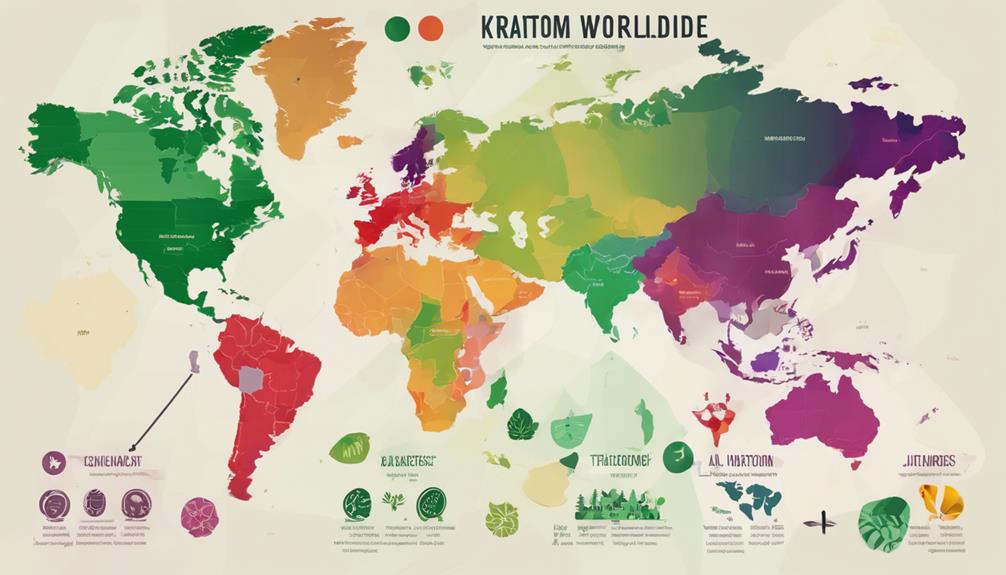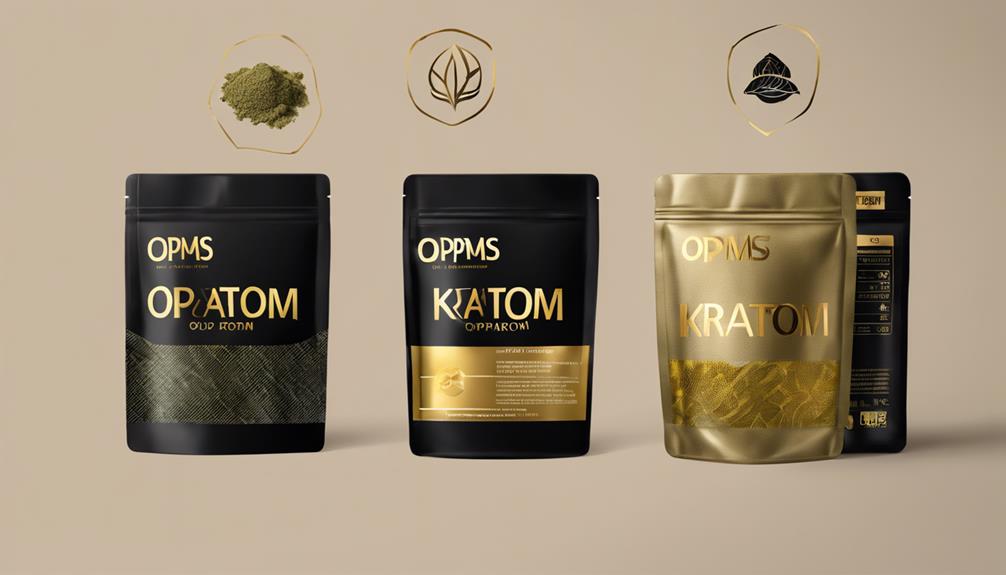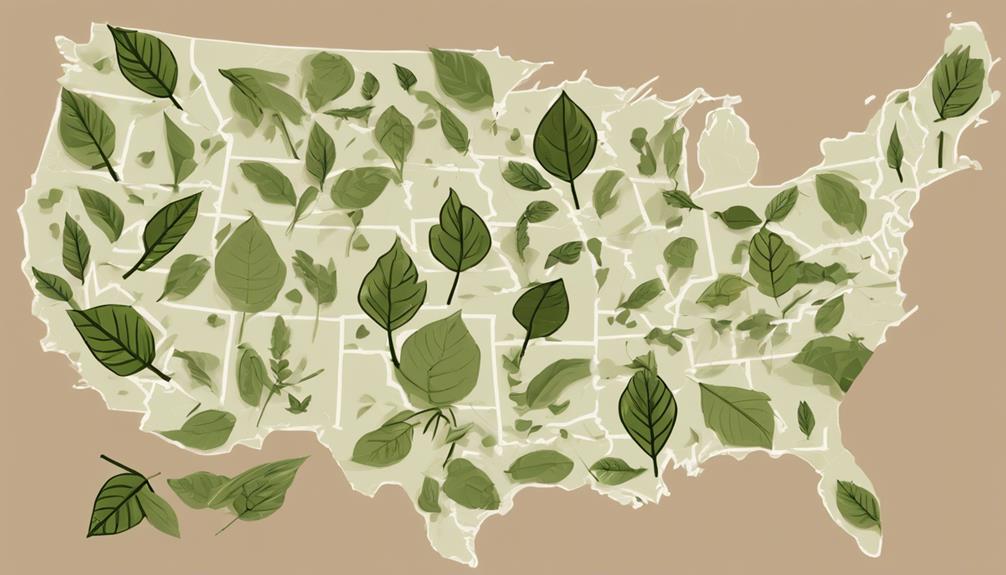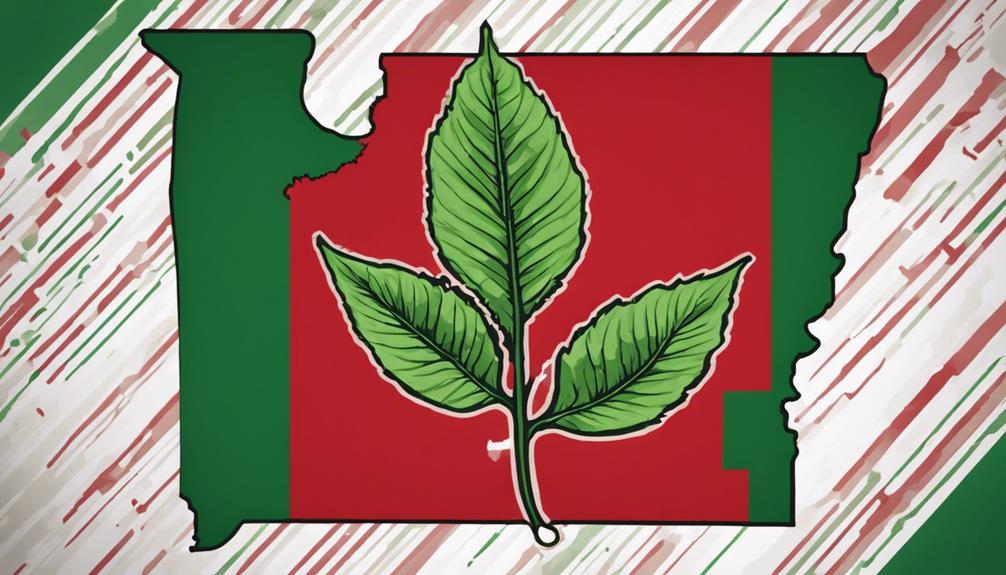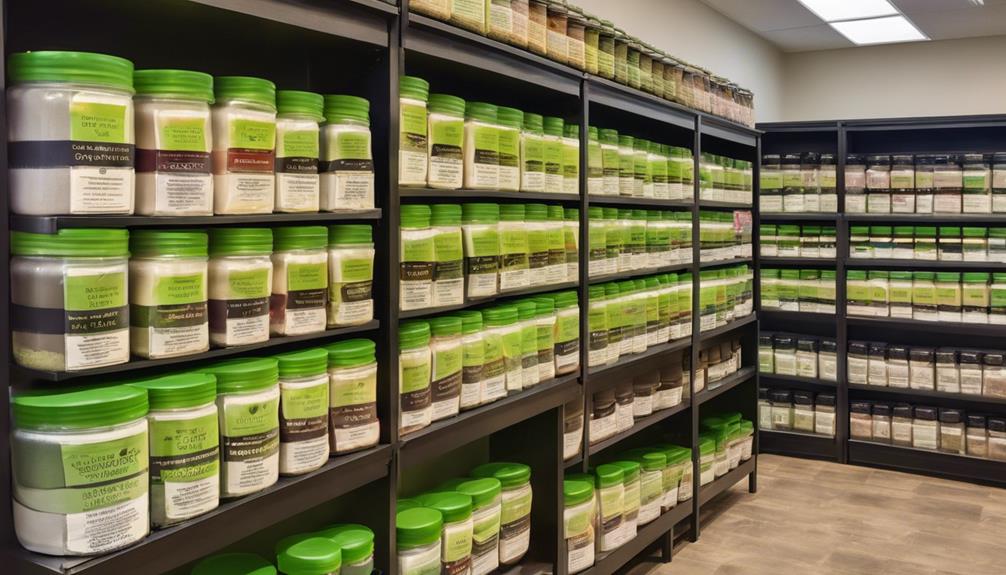Deprecated: mb_convert_encoding(): Handling HTML entities via mbstring is deprecated; use htmlspecialchars, htmlentities, or mb_encode_numericentity/mb_decode_numericentity instead in /home/users/kratomfiles/www/kratomfiles.com/wp-content/plugins/quick-adsense-reloaded/includes/template-functions.php on line 3552
As you explore the intricate web of kratom legality, you'll uncover a maze of regulations that can impact your ability to engage with this natural substance. From state-level bans to unique protections offered in certain regions, the landscape is far from straightforward. By understanding the nuances of these laws, you'll be better equipped to navigate the complexities and make informed decisions. Stay tuned to unravel the intricate tapestry of kratom legality and discover how it might influence your own experiences and choices in this evolving arena.
Key Takeaways
- Understanding state bans and regulations is crucial for legal kratom use.
- Local jurisdiction restrictions can impact kratom legality, even within legal states.
- Kratom Consumer Protection Acts enhance safety and quality standards in some states.
- Kratom legality varies across continents, with different countries having unique regulations.
- Staying informed on evolving kratom laws is essential for responsible consumption.
Overview of Kratom Legal Landscape
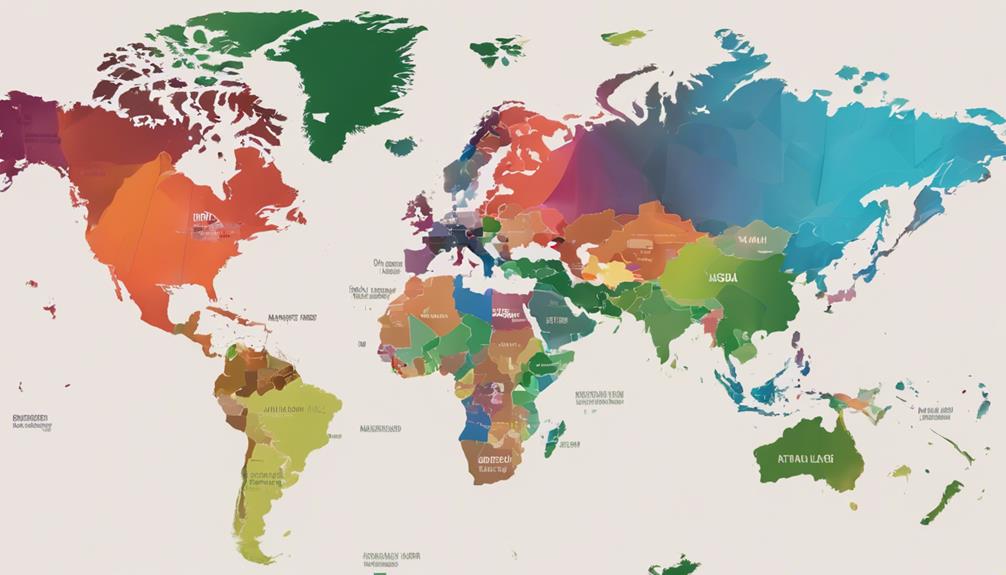
In the domain of legalities surrounding kratom, the landscape in the United States varies greatly from state to state. While some states have chosen to ban the use of kratom, others have opted for establishing regulations that govern its consumption and sale. The FDA has expressed safety concerns about kratom, attempting to classify it as a Schedule I controlled substance. Despite this, the American Kratom Association advocates for the legal use of kratom for various purposes. To address safety issues, some states have implemented the Kratom Consumer Protection Act. These acts aim to guarantee the quality and safety of kratom products available in the market. Understanding the legal framework surrounding kratom is essential for individuals who seek to use it responsibly and lawfully. By staying informed about the legal status of kratom in your state and being aware of any regulations in place, you can navigate the complexities of kratom legality with confidence.
State Bans on Kratom
Implementing bans on kratom in various states has resulted in a fragmented legal landscape surrounding its use and distribution. This has led to a mix of regulations, from outright bans to consumer protection laws, creating uncertainty for users and sellers alike.
- States with Bans: Alabama, Arkansas, Indiana, Rhode Island, and Wisconsin are among the states that have completely banned Kratom, making it illegal to possess or distribute the substance.
- Local Jurisdictions: Local bans in places like Illinois, New Hampshire, California, and Florida have added another layer of complexity to the legal status of Kratom.
- Consumer Protection Laws: States such as Arizona, Colorado, Georgia, Florida, and Nevada have opted for Kratom Consumer Protection Acts to regulate the product's sale and safeguard its safety for consumers.
These varying approaches highlight the lack of uniformity in Kratom regulations across the country, underscoring the challenges of maneuvering through the legal landscape surrounding this controversial substance. Bans on Kratom can also inadvertently drive its trade underground, increasing the risk of unsafe products entering the market.
Local Jurisdiction Restrictions
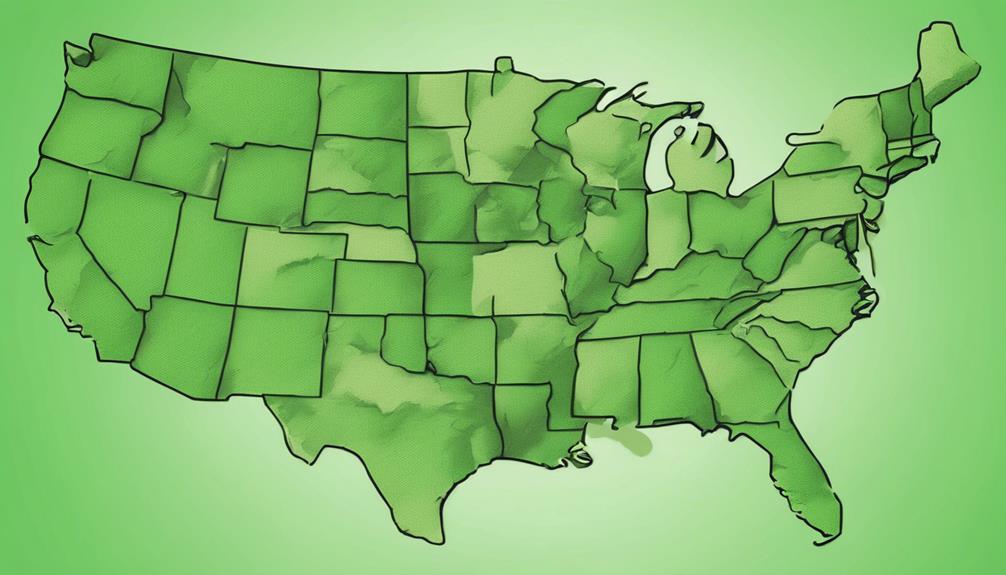
When it comes to kratom legality, it's important to be aware of city-specific regulations and county-level ordinances that might restrict or ban its use. These local jurisdiction restrictions can greatly impact kratom users, leading to legal complications if not followed correctly. Understanding the specific laws in each area is vital to avoid any potential penalties or legal issues.
City-Specific Regulations
Understanding the legality of kratom within specific cities across the U.S. requires a keen awareness of local regulations and restrictions. When it comes to kratom, city-specific regulations can greatly impact its legality. Here are some key points to take into account:
- Controlled: Kratom is controlled in certain cities, even in states where it is otherwise legal.
- Illegal: Some cities, like those in Illinois, New Hampshire, California, and Florida, have implemented bans on kratom.
- Varied Restrictions: Local regulations vary within states, creating a patchwork of legality for kratom.
To avoid legal issues, it's crucial to check local laws and ordinances to abide by kratom restrictions in specific cities.
County-Level Ordinances
Understanding the legality of kratom in various U.S. cities requires a meticulous grasp of local regulations, which extends to county-level ordinances impacting its accessibility and availability. Local jurisdictions such as Illinois, New Hampshire, California, Florida, and Mississippi have implemented bans or restrictions on kratom, creating a patchwork of legality within states. These county-level restrictions may differ from state laws, affecting the availability of kratom products in specific areas. Enforcement of these local ordinances also varies, leading to potential confusion for consumers. Being aware of county-level regulations is essential for individuals interested in using or purchasing kratom in certain regions to navigate the enforcement variations and comply with local ordinances.
Kratom Protection by KCPA
Kratom in several states, including Arizona, Georgia, Nevada, and Florida, benefits from protection under Kratom Consumer Protection Acts (KCPAs) that enforce safety and quality standards for its products. These KCPAs aim to guarantee the safety and quality of kratom products through regulations and standards, promoting consumer transparency and accountability within the industry. States implementing KCPAs prioritize consumer safety by regulating the production and labeling of kratom products, ensuring that consumers receive high-quality and safe products. This level of oversight not only safeguards consumers but also helps to legitimize the kratom industry, fostering trust and confidence among users.
- KCPAs in various states enhance safety and quality standards for kratom products.
- Regulations and standards enforced by KCPAs promote transparency and accountability.
- Consumer safety is a top priority in states with KCPAs, ensuring the quality and labeling of kratom products meet established standards.
Kratom Legality in Africa
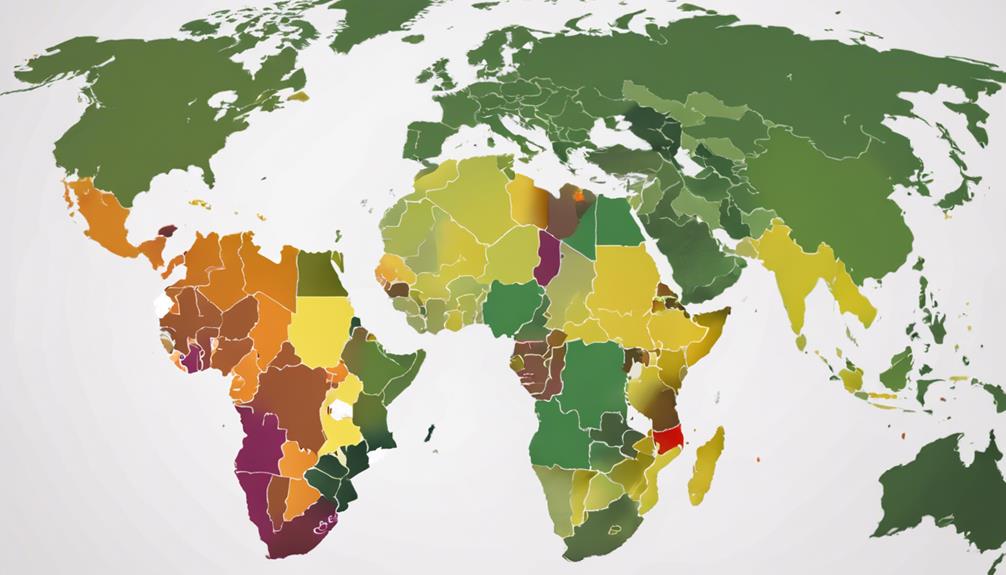
In Africa, the legal stance on kratom varies widely by country, with South Africa standing out as one of the few where it is legal and not classified as a controlled substance. Recent regulatory changes in South Africa have allowed for the sale and use of kratom without restrictions, making it readily accessible to consumers. The future outlook for kratom in Africa remains uncertain, as other countries on the continent may choose to follow South Africa's approach or implement stricter regulations.
Africa's Legal Stance
With varied regulations across the continent, understanding the legality of kratom in African countries can be complex and uncertain. When it comes to kratom in Africa, the legal status is a mixed bag. Some countries lack specific regulations on its use, while others have unclear or unregulated policies. South Africa specifically does not ban or regulate kratom. Advocacy and awareness efforts play an important role in shaping potential future regulations regarding kratom in African nations. Remember, if you plan to travel with kratom to Africa, it is essential to research and be aware of the local laws to avoid any legal complications.
- Some African countries have no specific regulations on kratom.
- South Africa does not explicitly ban or regulate kratom.
- The legal status of kratom in most African countries remains unclear or unregulated.
Recent Regulatory Changes
Recent regulatory changes in Africa regarding the legality of kratom have brought about a shift in the landscape of controlled substances. South Africa stands out as a country where kratom is legal and not classified as a controlled substance. The diverse legal landscape across Africa means that while some countries have strict regulations on kratom, South Africa allows its use without specific bans or restrictions. This unique approach sets South Africa apart from other nations on the continent. As these recent regulatory changes continue to shape the status of kratom legality in Africa, South Africa remains a notable example of a country where individuals can access and use kratom without facing legal barriers.
Future Outlook for Kratom
Looking ahead at the future outlook for kratom legality in Africa, the landscape remains dynamic and subject to potential shifts as advocacy efforts and research continue to influence legislative decisions.
- Advocacy Efforts: Organizations pushing for the recognition of kratom's potential benefits could impact future regulations.
- Legislation Changes: The legal status of kratom in African countries is uncertain, leaving room for shifts based on evolving laws.
- Awareness and Research: Increased awareness and scientific studies may play a pivotal role in shaping the future of kratom regulations in Africa.
These factors will likely contribute to the changing landscape of kratom legality on the continent, highlighting the importance of staying informed on this topic.
Kratom Legality in Asia
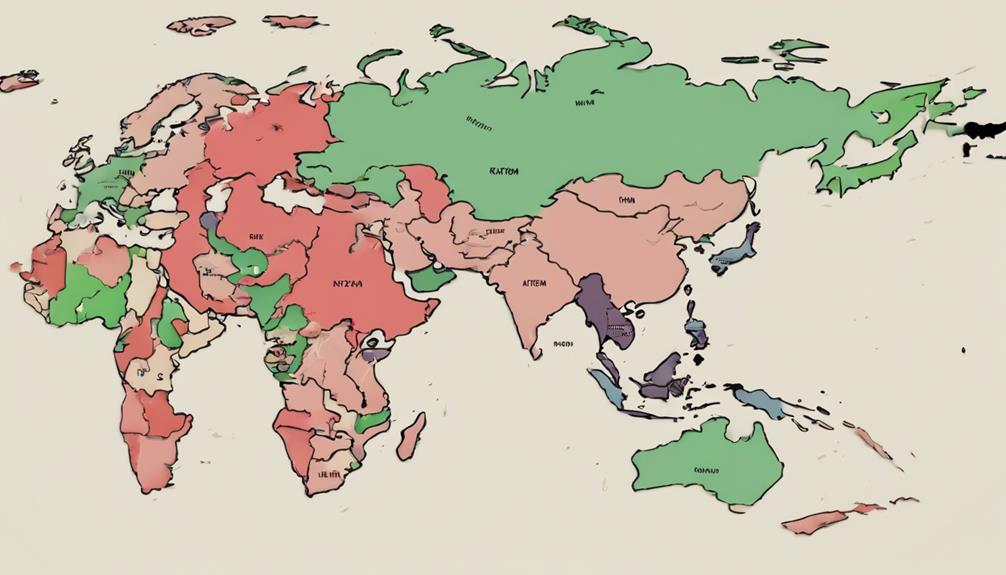
In Asia, the legality of kratom varies across different countries, with strict regulations in place governing its production and distribution. Thailand, where kratom was banned in 1943, has recently permitted its use for medical and research purposes. Malaysia, under the Poisons Act 1952, classifies kratom as a controlled substance, limiting its usage and distribution. Myanmar strictly prohibits the production, possession, and distribution of kratom through the Kratom Act of 1993. Bhutan, governed by the Narcotic Drugs, Psychotropic Substances and Substance Abuse Act of 2015, has enforced a complete ban on the cultivation, harvesting, and consumption of kratom. Indonesia, being the largest kratom producer globally, has established regulations to oversee its export and ensure compliance with international narcotics agreements. These varying legal stances across Thailand, Malaysia, Myanmar, Bhutan, and Indonesia highlight the diverse approaches to kratom regulation in Asia.
Kratom Legality in Australia & New Zealand
Kratom's legality status in Australia and New Zealand starkly contrasts with that in other regions, reflecting stringent regulations due to safety concerns and abuse potential. In Australia, Kratom is classified as a Schedule 9 substance, making it illegal for import, export, and use. Similarly, in New Zealand, it is considered a controlled substance under the Misuse of Drugs Act, leading to its illegal status for possession and distribution. Both countries have implemented strict regulations surrounding Kratom to address worries about its abuse potential and safety risks. Possessing or selling Kratom in Australia or New Zealand can result in severe legal consequences, such as fines or imprisonment. The cautious approach towards Kratom's availability in these nations signifies a commitment to safeguarding public health and preventing potential misuse.
Kratom Legality in Europe
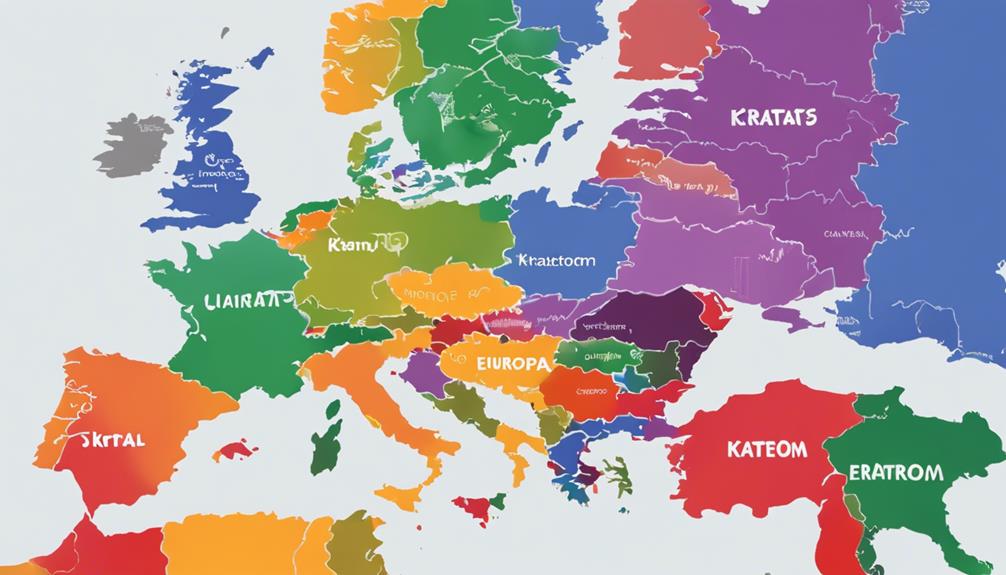
The legal status of kratom in various European countries exhibits a complex and diverse landscape with contrasting regulations. In Europe, countries like Spain and Ukraine have legalized kratom, treating it as a non-controlled substance. Conversely, nations such as Portugal, Russia, Sweden, Switzerland, and Turkey have categorized kratom as a controlled or prohibited substance. Additionally, Poland, Romania, and Slovakia have gone a step further by classifying kratom as a prohibited narcotic or psychotropic substance. This highlights the diverse legal stances on kratom within Europe, showcasing the varying regulations across different countries. Legislative changes concerning kratom's legality are ongoing in Europe, contributing to a dynamic legal landscape where the status of kratom is subject to evolution. As a consumer or enthusiast of kratom in Europe, it is essential to stay informed about the ever-changing legal framework surrounding this herbal supplement to navigate the intricate regulatory environment effectively.
Kratom Legality in North America
In North America, Kratom's legal status varies. In the U.S., states like Alabama, Arkansas, Indiana, Rhode Island, and Wisconsin have banned Kratom, while others have implemented regulations like the Kratom Consumer Protection Acts (KCPAs). Canada and Latin American countries also have their own set of rules governing the use of Kratom.
US Kratom Laws
Understanding the legal landscape of kratom in the United States can be complex due to varying state regulations and bans. When it comes to US Kratom Laws, here are some key points to take into account:
- Six states, including Alabama, Arkansas, and Wisconsin, have banned kratom.
- States like Arizona, Georgia, and Nevada have implemented Kratom Consumer Protection Acts (KCPAs) to regulate kratom products.
- The legal status of kratom in North America varies greatly, with active KCPAs in some states while others have outright banned it.
Navigating the intricacies of kratom laws is essential to guarantee consumer protection and safety, especially in states where kratom remains unregulated or prohibited. Stay informed to make informed decisions in this evolving legal landscape.
Canada Kratom Regulations
Understanding the legal framework of kratom in Canada requires knowledge of provincial regulations and compliance standards. Kratom is legal for sale and consumption throughout Canada, but it is crucial to note that regulations may differ by province. Health Canada has not approved kratom for medicinal use, emphasizing the significance of consumer awareness and responsibility. Canadian kratom vendors must adhere to stringent quality and safety standards to guarantee the well-being of their customers. It is advisable for consumers to conduct thorough research on local laws and regulations before purchasing kratom to guarantee legality and safety. By staying informed and abiding by the established guidelines, individuals can navigate the Canadian kratom market with confidence and peace of mind.
Kratom Legality in South America
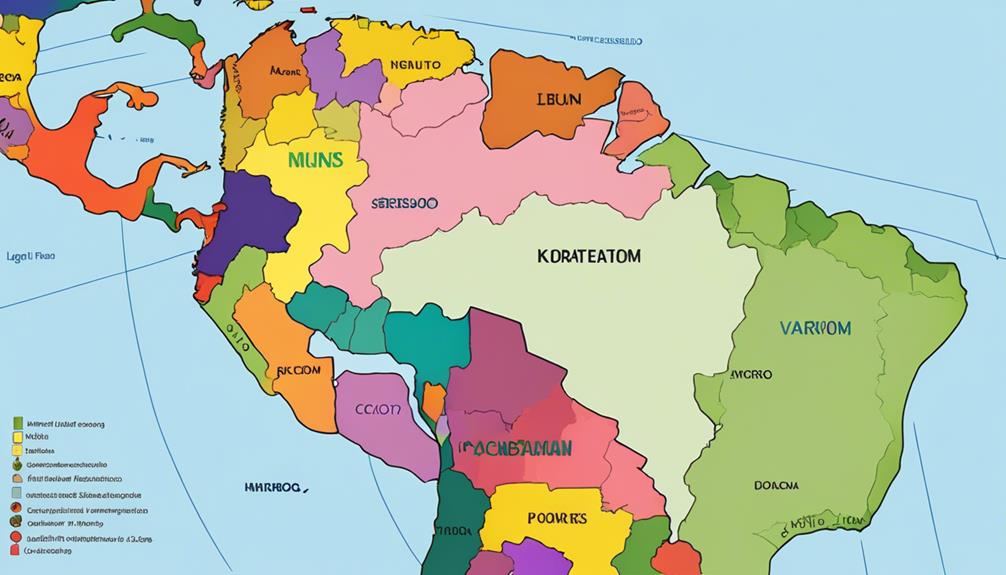
Kratom's legal status in South America reflects a generally lenient approach towards its regulation. The region tends to have favorable laws concerning kratom, with most countries allowing its usage with varying degrees of regulation. Unlike some other parts of the world, South America has not explicitly banned or tightly controlled kratom, leading to a more relaxed environment for its consumption. Additionally, there have been no reported instances of kratom bans in South American countries, highlighting the acceptance of this substance in the region.
- Kratom is legal in most South American countries, with varying levels of regulation.
- Some countries in South America have not explicitly banned or regulated kratom.
- There are no reported instances of kratom bans in South American countries.
South America has not witnessed significant legislative changes regarding kratom legality, indicating a stable legal environment for kratom users in the region.
Is Thrive Kratom Legal in the Areas Covered by the Kratom Legality Map?
Yes, Thrive Kratom is legal in the areas covered by the Kratom Legality Map. This natural kratom supplement for thriving is legal and available for purchase in the outlined regions. Be sure to check the map for specific details regarding kratom legality in your area.
Is it Legal to Use Kratom with the Kratom Spot Coupons?
Yes, it is legal to use kratom spot coupons offer when purchasing kratom products. Kratom is legal in most states, and using coupons to buy kratom spot products is a great way to save money on your purchases. Make sure to check the terms and conditions of the coupons before using them.
Best Places to Buy Kratom
Given the lenient legal stance on kratom in South America, exploring the best places to buy kratom becomes a practical consideration for users seeking quality products. One online vendor that stands out for its high-quality kratom offerings is Kraken Kratom. They are known for their wide range of strains, including popular options like Maeng Da Thai and Ultra Enhanced Indo. Kraken Kratom also caters to customers looking to stock up by providing bulk stash offerings. Additionally, customers can enjoy a diverse selection of products, from kratom powder to even kratom-infused chocolate bars. With a strong emphasis on quality assurance and customer satisfaction, Kraken Kratom makes sure that every customer has a positive buying experience.
| Online Vendor | High-Quality | Strains |
|---|---|---|
| Kraken Kratom | Yes | Maeng Da Thai |
| Ultra Enhanced Indo |
Customers looking for reliable vendors with a focus on quality and a diverse range of strains should consider Kraken Kratom for their kratom needs.
